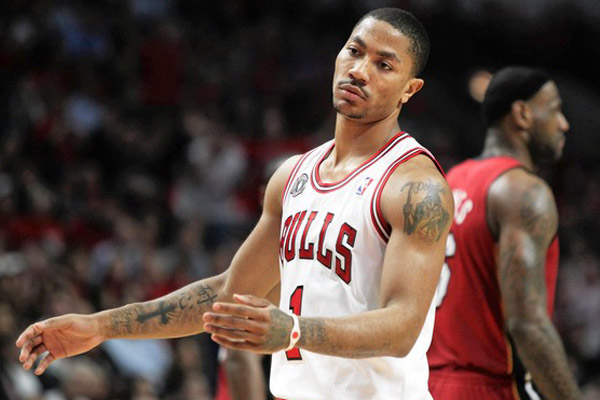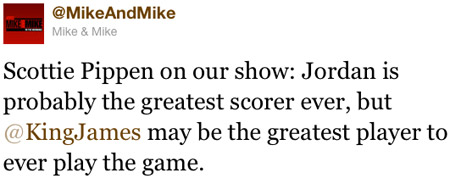
Update: Uh-oh. We know this is going to be the great basketball debate of the decade, so Scottie Pippen might as well get it started:

Listen here. It’s poetic that Pippen is making this call, since right now I think that realistic people view LeBron as a much better version of Pippen: he’s got Pippen’s broad skill set in a bigger, more powerful body. And as was the case when Pippen was without Jordan, whether or not LeBron can acquire the killer, alpha-dog mindset of Jordan when he needs to is still an open question.
So maybe there’s some bias; it wouldn’t surprise me if Pippen (fairly) sees a lot of himself in LeBron’s game.
Chicagoans, I’m sure, wildly disagree with Pippen. As they should; as of now, he’s wrong. But as noted below, LeBron’s in his seventh year, and that’s how long it took Jordan to win a title. And Jordan was 28 when he won the first of his six championships; LeBron’s now 26. This debate isn’t going to go away.
"At the end, it’s on me. Everything is on me. Turnovers. Missed shots. Fouls," Derrick Rose told the media last night. And it’s true that the young MVP looked uncharacteristically nervous, making some critical turnovers and pressing some bad shots. But it’s not all on him; not even close.
1. The Heat were not the same Heat the Bulls beat up on in the regular season. Back then they were missing Udonis Haslem, their co-captain and toughest interior player: their Joakim Noah, except bigger and stronger. They were also missing Mike Miller, a fantastic outside shooter who opens up the floor for the Big 3, and an outstanding rebounder for a guard. As Jeff Fogle points out, it was really the first time the Heat had their intended crunch-time five playing significant minutes, and Haslem and Miller made a huge difference. While you should be a bit skeptical of plus/minus numbers, Haslem and Miller were an astounding +25 and +36 in Game Four, even though their points and boards were not, in and of themselves, impressive.
That lineup gives the Heat four good to great jump-shooters—Chris Bosh is not only quick, he has a good touch—the shortest of whom, Dwyane Wade, is 6-4. It’s a big, strong, fast team that can hit the medium-to-long-range jumpers the Bulls try to force.
2. Carlos Boozer was inconsistent. In the Bulls’ four losses, Boozer put up the following points/boards numbers:
Game 2: 7/8
Game 3: 26/17
Game 4: 20/11
Game 5: 5/6
3. Kyle Korver was awful. In the four losses, Korver shot 32 percent from the field and 25 percent from three point range, compared to 43/41 in the regular season. And that’s his job: to shoot a high percentage from outside. Like Miller, he’s supposed to open up the floor; if he’s off, he doesn’t bring anything to the table. Korver might seem like a bit player, but Bulls fans will recall the vital role John Paxson and Steve Kerr played from long range in clutch situations.
Rose, of course, didn’t shoot well either: 33 percent from the field and 17 percent from behind the arc in the four losses, compared to 45/33 in the regular season. But without better offensive support, Rose pressed hard.
There just haven’t been a lot of great teams built like the Bulls, with the offensive focus on a short, fast point guard with a good but not elite outside shot. The only team that comes to mind is the Philadelphia 76ers, but Allen Iverson was comfortable in his role as a shoot-first point guard, and was also in his fifth year in the league. Rose just finished his third.
Isiah Thomas, whose role on the Pistons was comparable but not identical to Rose’s, took seven years to make the Finals, eight to win it.
And, of course, it took Michael Jordan’s Bulls seven years to not just win the NBA title, but just to finish first in their division (LeBron is also in his seventh year; Dirk Nowitzki is in his 11th). As is clear from Bryan Smith’s oral history of the 1991 Bulls, and Ted Cox’s 1989 piece about the team’s attempt to assemble a supporting cast for the best player in basketball history, it took years for the Bulls to put together a great team. But it wasn’t just a matter of finding the right players; they had to get used to each other, and Jordan had to adapt to all the new pieces.
It’s hard to ask Chicago fans to wait ’til next year. But it’s worth it. And now we have a hell of a rivalry to look forward to.
Photograph: Chicago Tribune


